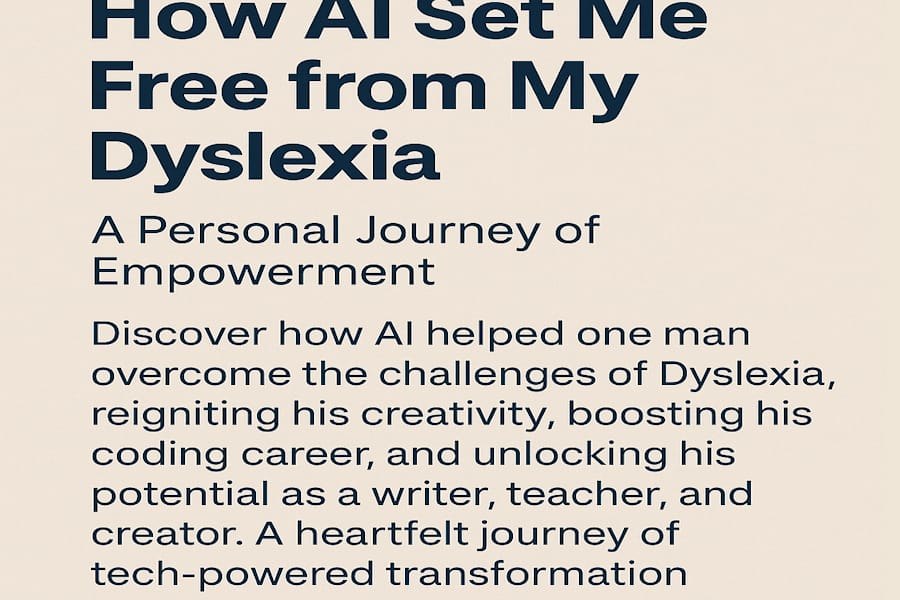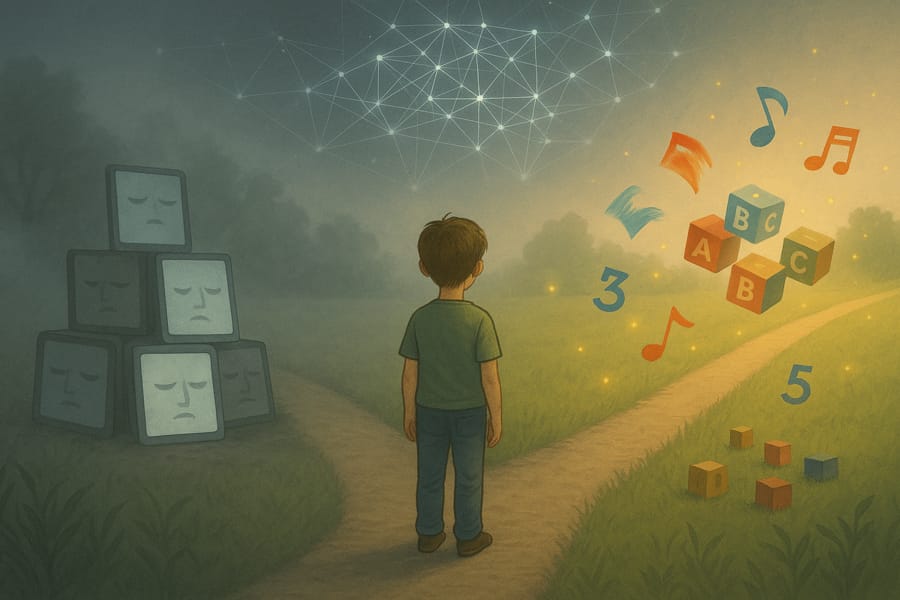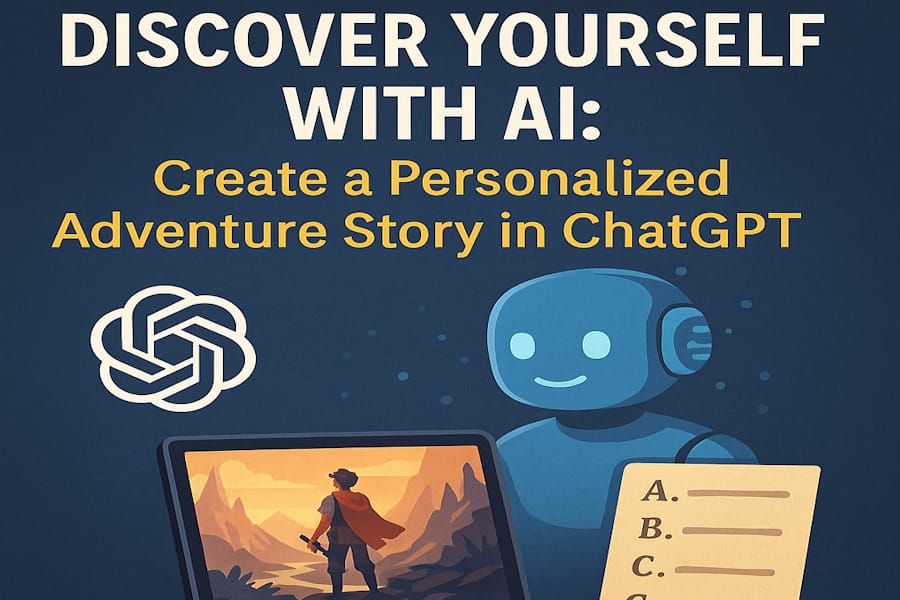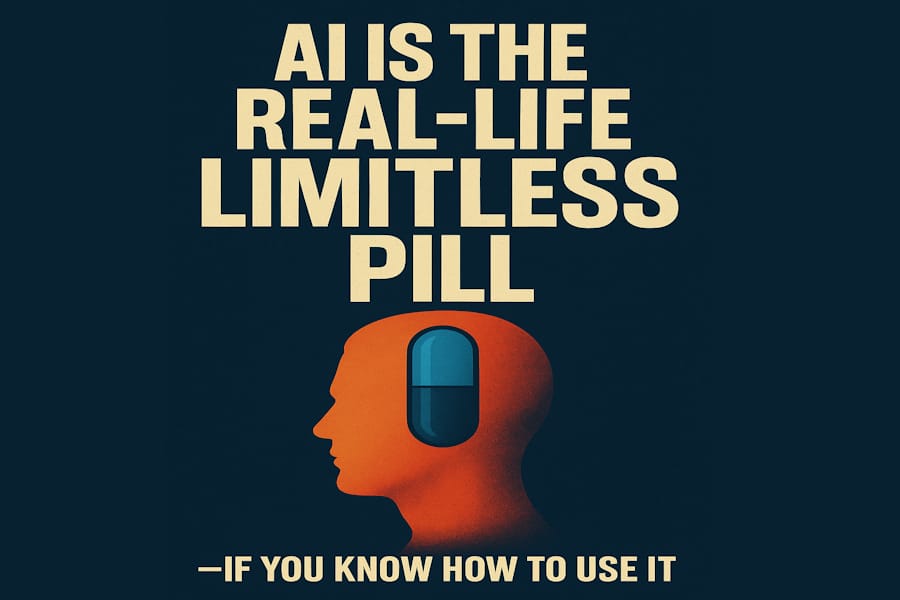Type: Article -> Category: AI Wellbeing
How AI Set Me Free from My Dyslexia

Publish Date: Last Updated: 13th January 2026
Author: nick smith- With the help of CHATGPT
View a condensed YouTube Short on this article
When I was 12 years old, I was told I had Dyslexia. Like many neurodiverse conditions, Dyslexia exists on a spectrum, and while my case wasn't severe, it still had a profound and long-lasting impact on both my education and my career.
On a personal level, Dyslexia made reading and writing a daily struggle. I often mixed up words, swapped letters, and confused homophones like "where" and "were," "off" and "of." My spelling was — and still is — shaky, and I tended to repeat myself or ramble in writing. My mind was always buzzing — inquisitive, energetic, creative — but impossible to calm.
School in the 1980s didn’t offer much in the way of support. Everything was geared toward final exams. I thrived in coursework and projects but consistently underperformed in exams, which meant I always felt like I was falling short. There was no recognition of how my brain worked differently.
By 17, I had decided academia wasn’t for me. I needed something practical — something where written reports and forms weren’t part of the daily routine. I drifted into the transport industry, largely because I loved cars and driving. It was physical, time-sensitive, and dynamic. And importantly, it didn’t require constant writing.
Eventually, I found my niche in logistics. Despite my Dyslexia, I had a knack for coordination. The paperwork was a nightmare, sure, but the challenge of getting vehicles and people where they needed to be — efficiently, on time — was something I naturally excelled at. It felt good to be good at something.
Meanwhile, a hidden part of me remained fascinated with computers. Against the advice of a career counselor who told me to stay away from technical work, I slowly began to explore coding. This was the late '80s — no Stack Overflow, no YouTube tutorials. Just dense, expensive books written by experts who forgot what it was like to be a beginner.
My Dyslexia made coding harder. Misspelling a variable could kill hours. Syntax errors were like invisible enemies. Debugging wasn’t just technical — it was emotional. Still, I kept learning. Through job shifts, life changes, and even a failed marriage, I stuck with it.
In my 40s, after hitting a personal low point, I enrolled in a Computer Science degree. Times had changed — there was support for people like me now. More importantly, coursework was valued as much as exams. I was finally in an environment where I could thrive.
During my foundation year, my college noticed I had strong WordPress and coding skills, and soon I was teaching others. I struggled with the teaching qualifications — more exams! — but my student feedback was glowing. And when it came to coursework? I earned thirteen A+ grades and graduated with First Class Honours.
I loved teaching, but the paperwork was draining. So, after the degree, I moved into industry roles. Then COVID hit. Redundancy followed. Despite my experience, I couldn’t land a job — age bias and changing job markets were a wall I couldn’t climb. After a year, I pivoted again.
I entered the care sector. It was something completely different, but I found meaning in it — working with elderly men suffering from dementia, making a real difference in people's lives. And the flexible hours allowed me to return to coding in my spare time.
Then I discovered AI.
I first used AI to help with code — writing complex regex, troubleshooting logic, refactoring messy scripts. It was a game-changer. AI didn’t just understand my code; it helped me understand myself. I realized that AI was the ideal partner for someone with Dyslexia: patient, non-judgmental, adaptable, and always ready to assist.
But it didn’t stop at code.
I’ve always wanted to write. I had thoughts, stories, philosophies — but translating them to text was exhausting. With AI, I began drafting my ideas and then asking it to clean them up. It helped trim the waffle, correct the grammar, and point out assumptions I hadn’t noticed. It became my editor, tutor, and writing partner.
Since then, I’ve:
-
Built my own CMS system
-
Created over 100 articles
-
Launched 3 YouTube channels
-
Grown my site from 0 to 10,000 monthly views — even with setbacks like being banned from Bing for using AI
AI allows me to engage with every part of my mind — the practical, the philosophical, the technical, the creative — and it doesn’t judge me for how I get there.
Why AI is a Game-Changer for People with Dyslexia
Dyslexia affects an estimated 10–15% of the population. It's not a measure of intelligence, but a difference in how the brain processes language. People with Dyslexia often have strengths in creativity, problem-solving, spatial reasoning, and emotional intelligence — yet traditional educational and professional systems rarely celebrate these strengths.
AI is changing that.
-
Writing support: Tools like ChatGPT can help structure thoughts, check grammar, simplify complex language, and reduce anxiety around writing.
-
Reading support: AI can summarize documents, read text aloud, and explain tricky concepts in simpler terms.
-
Coding assistance: With autocomplete, syntax suggestions, and code debugging, AI is a supportive co-pilot for dyslexic coders.
-
Planning and organizing: AI tools help streamline workflows, set reminders, and structure chaotic thinking into clear action plans.
Final Thoughts
AI has given me back the part of myself that Dyslexia tried to hide. It doesn’t fix Dyslexia — but it makes it irrelevant. It empowers me to express myself fully, to build, to teach, to create — without barriers.
To anyone with Dyslexia reading this: use AI. Don’t let an outdated system define your potential. AI doesn’t care if you spell things wrong or mix up your tenses. It just wants to help.
And in that way, it has truly set me free.
Latest AI Wellbeing Articles
AI Questions and Answers section for How AI Set Me Free from My Dyslexia
Welcome to a new feature where you can interact with our AI called Jeannie. You can ask her anything relating to this article. If this feature is available, you should see a small genie lamp above this text. Click on the lamp to start a chat or view the following questions that Jeannie has answered relating to How AI Set Me Free from My Dyslexia.
Be the first to ask our Jeannie AI a question about this article
Look for the gold latern at the bottom right of your screen and click on it to enable Jeannie AI Chat.
Type: Article -> Category: AI Wellbeing










